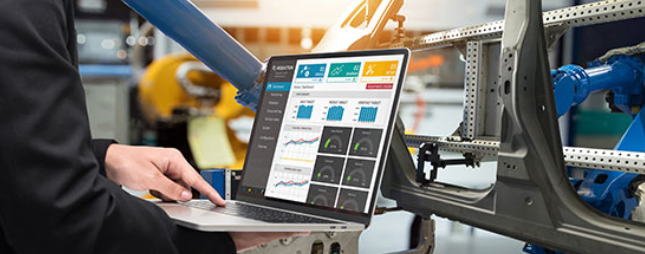
There are many benefits of implementing an Enterprise Resource Planning (ERP) system for your manufacturing business. An Enterprise Resource Planning or ERP system is used to automate and simplify daily business processes such as accounting, compliance and supply chain operations, project management, customer relations, and risk management into one core location.
Over the past year or so, ERP systems have become extremely popular and are no longer the exclusive domain of multinational operations. Nearly 35% of ERP implementation in the past year have come from companies who were using a legacy system, published in a report by FinancesOnline Reviews for Businesses. Virtually every business will need a modern ERP system to manage their daily business processes.
If you’re on the fence about implementing an ERP system, consider how each of these areas will provide benefit to your business: streamlined business processes, easier forecasting and reports, enhanced decision making, greater employee efficiency with mobility and flexibility, improved productivity, increased data security, supply chain integrations, reduced costs, quicker response to market conditions, and superior customer service. Each of these benefits will enhance your business and enable your employees to achieve better results. Ultimately, a more competitive and profitable business is one of the most significant benefits of an ERP system in the manufacturing industry.
(1) Automate and streamline business processes with adaptability. An ERP system will streamline all of your daily business processes by maintaining real-time data in one centralized location with complete visibility in all functionalities. End-users will have the ability to monitor production stats without the assistance of an additional team member.
The ERP system will automate business processes for a reduced dependence on manual processes. This automation will accelerate your production process, minimizes the probability of errors, and improves profitability.
(2) Easy forecasting and reporting. Many manufactures have faced the horror of an unexpected demand for a particular item. An ERP system helps avoid these situations by generating forecast and sales reports based on past inventory transactions. This avoids the clutter of excess inventory and the horror of an out-of-stock situation.
Plus, end-users can run their own reports without relying on the IT team to predict future demand and material requirements. User-friendly modules are easy to read and eliminate the risk of error.
(3) Enhanced decision making. Any choice short of reliable data is a guess – not a decision. An ERP system will collect and sort every piece of essential data into a single location for real-time, up-to-date information. Increased insight, visibility, and control will give your manufacturing business the confidence you need to make trusted decisions.
(4) Greater employee efficiency with mobility and flexibility. The ERP market is huge – end-users can access data from mobile phones, tablets, laptops, and desktops. But wait, it gets better – users can access this data from practically anywhere whether they’re on the move, working from home or in the warehouse. Mobile friendly ERP systems empowers users to access documents, make edits and approvals while on the go.
(5) Improved productivity. With the ability to manage schedules, streamline financial operations, oversee sales processes, produce real-time data, reduce data errors, ensure prompt communication between employees, and make data easily accessible to all, your manufacturing business is guaranteed to save time and money.
(6) Increased data security. With the increasing pressure to secure and protect data, software developers are constantly searching for security issues. Data exposure can produce catastrophic financial repercussions and cause damage to your reputation. While new software improvements are constantly being made in modern ERP systems, outdated legacy systems are not being actively checked for security breaches.
(7) Integration with supply chain. Integrated ERP systems offer strong supply chain management resources to optimize the inflow and outflow of material, and distribution requirements for centralized purchasing locations and multi-warehouse distribution channels.
(8) Quicker response to market conditions. Real-time data provided by the ERP system helps key decision makers estimate, plan, adjust and respond to the never-ending market changes. System generated reports are presented on a regular cadence to assist with the understanding of market demands and capitalize on consumer purchasing trends. These detailed insights will reduce forecasting errors and capitalize on new opportunities for your growing manufacturing business.
(9) Reduced costs. A modern ERP system will reduce overall operational costs as manual, time-consuming processes are replaced with automated, streamlined processes and real-time information. Ultimately, you will see a reduction excess inventory and warehousing costs with the ability to accurately track inventory.
(10) Superior customer relationships. Today’s consumers expect immediate feedback on their purchases and on-time deliveries. An ERP system will provide your manufacturing business with accurate production plans, inventory control, streamlined scheduling, and coordination with distribution channels for on-time delivery. Add in faster delivery, better quality control, a stronger grip on inventory, and your customers are sure to increase their loyalty.
ERP software has become the leading solution choice for the growing manufacturing industry. Signs that your business is ready to implement an ERP system:
If you want to maintain and improve your competitive edge, contact the ACC team to begin your ERP journey!

Solutions by Industry
What's New
Outgrowing Your ERP? Why Acumatica is the Upgrade You Need
Read MoreSubmitted by Stephanie Dean on Thu, 06/26/25 - 15:52
Why You Should Make the Switch: NetSuite to Acumatica
Read MoreSubmitted by Stephanie Dean on Tue, 06/17/25 - 13:36
Acumatica ERP for Sustainable Businesses
Read MoreSubmitted by Stephanie Dean on Thu, 05/29/25 - 10:37